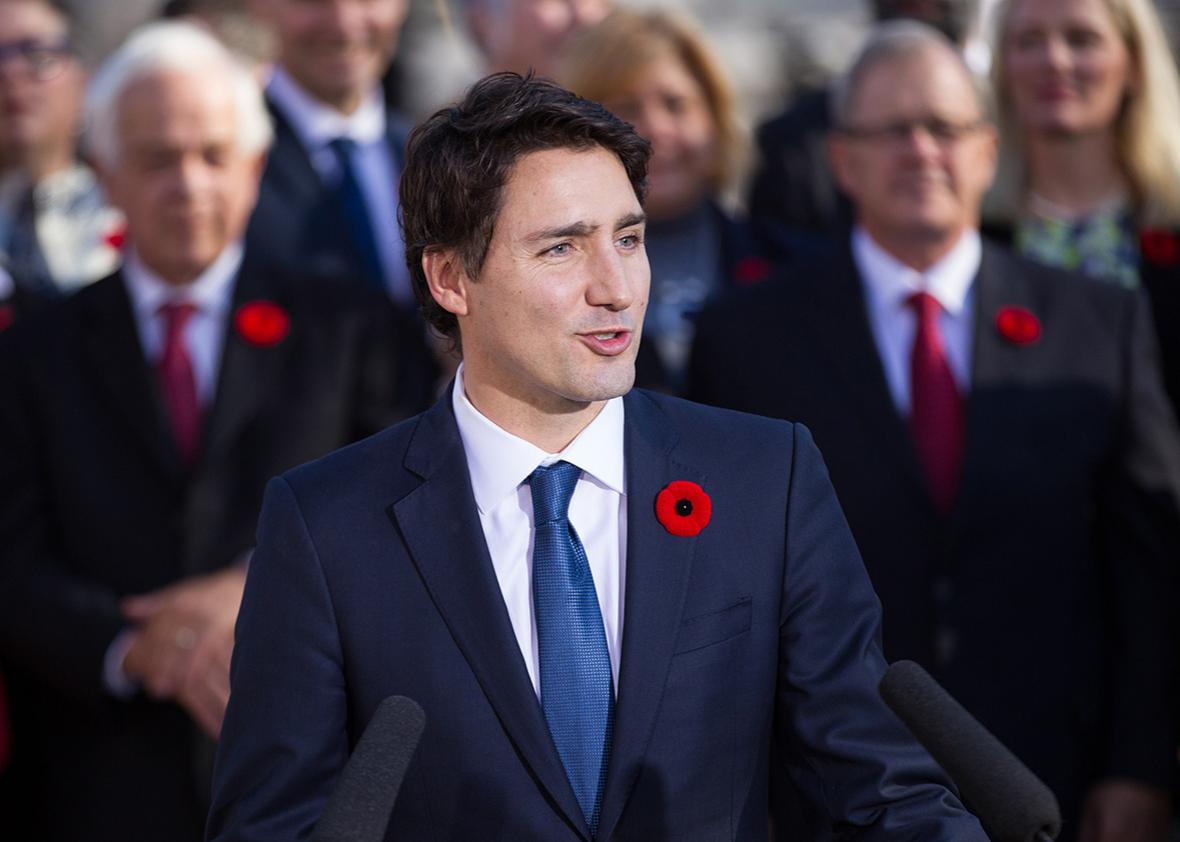Justin Trudeau, the newly minted prime minister of Canada, promised to implement gender parity among the country’s top ministers, and he did just that this week. Trudeau’s new Cabinet, announced Wednesday, is made up of 15 men and 15 women, representing perfect gender parity for the first time in Canadian history.
When a reporter asked him this week why gender parity was so important to him, Trudeau simply shrugged and replied: “Because it’s 2015.” (The current 16-person Cabinet in the Obama administration is 25 percent female.)
Trudeau’s Cabinet is also young and ethnically diverse. Trudeau, 43, the second-youngest prime minister in Canada’s history, says he is striving to “present to Canada a Cabinet that looks like Canada.”
The Cabinet includes two aboriginal members of parliament and three Sikhs, including former Afghanistan refugee Maryam Monsef, who is the minister of democratic institutions, and a turbaned Sikh, Harjit Sajjan, as his new minister of defense. Two of Trudeau’s Cabinet members have disabilities, including Carla Qualtrough, a visually impaired former Paralympian and human rights attorney who will become minister of sports. She will be the first legally blind person in Cabinet. Trudeau’s minister of transport is Marc Garneau, Canada’s first astronaut. Scott Brison, president of the Treasury Board, made history in 2007 when he became the first federal politician to marry his same-sex partner.
Trudeau has also has created, for the first time, a minister of science position and he renamed the environment minister post as minister of environment and climate change. As if that’s a thing.
In a swearing-in ceremony that included Inuit throat singers, drums, a Pottawatami-Cree youth, and an acknowledgement from the Governor General’s office that the ceremony was taking place on Algonquin land, Trudeau also named Canada’s first-ever indigenous justice minister and attorney general of Canada, Jody Wilson-Raybould, a former crown prosecutor and First Nations leader from British Columbia. Wilson-Raybould, 44, formerly the British Columbia regional chief of the Assembly of First Nations, will be the third woman, after Kim Campbell and Anne McLellan, to serve as Canada’s attorney general.
All that would be remarkable and inspiring in its own right, but there is just one last gorgeous detail that surfaced last night when my friend Sonia Lawrence, who teaches at York University’s Osgoode Hall Law School in Toronto, posted a link on her Facebook page to a 1983 segment of CBC News. It was a report of a meeting between Aboriginal groups and the government of Pierre Elliott Trudeau (that would be Justin’s father) to discuss amending the Constitution of Canada to protect native rights. At times things got sticky and uncomfortable, but it’s worth the wait for a moment at about 3:30—the kind of moment that makes you grateful for the wonders of archival video.
I’ll let Lawrence explain what you are looking at, from last night’s Facebook post:
1983: constitutional talks. Father of @Puglaas (Hon Jody Wilson-Raybould) Bill Wilson tells Trudeau Sr. he has 2 daughters who want to be PM. Look around the room. Listen. (around 3:30) Sometimes I hear the laughter as something other than sweet and heartwarmed. Watch Wilson’s face as they laugh, though. I have been showing this clip to my class for at least five years. Today one daughter became the Minister of Justice.
That’s it. History foreshadowed.
As the Vancouver Sun reported Wednesday: Wilson-Raybould is a member of the We Wai Kai Nation and served as regional chief of the Assembly of First Nations from 2009 until 2015. She is the daughter of Bill Wilson, a lawyer and prominent aboriginal leader and uses Puglaas—the native name given to her by her grandmother—as her Twitter handle. It means “a woman born to noble people.” She is a descendant of the Musgamagw Tsawataineuk and Laich-Kwil-Tach peoples, which are part of the Kwakwaka’wakw and also known as the Kwak’wala-speaking peoples. The Kwakwaka’wakw were the traditional inhabitants of northern Vancouver Island, the adjacent mainland, and local islands.
Wilson-Raybould’s father, Bill Wilson, was a firebrand and an outspoken First Nations leader, responsible for helping push forward amendments that would protect aboriginal rights into Canada’s constitution. We complain a lot about legacies, but some of them are hard-fought and worthy. Watching a room full of mostly men laughing at-slash-with Jody Wilson-Raybould’s dad in 1983 reminds us where we have come from and how swiftly change can in fact happen.
